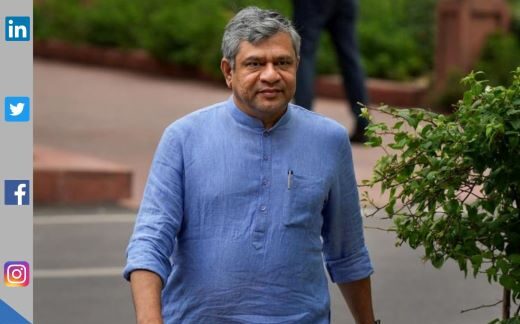Your cart is currently empty!
Category: Business News
Stay up-to-date with the latest IT, Business, and Corporate News on Jobs Innovators. Explore in-depth articles, insights, and trends to fuel your knowledge and stay ahead in the dynamic world of business and technology.

Infosys Secures $1.6 Billion Deal with Liberty Global, Adding 400 New Employees

In a groundbreaking move that is poised to redefine the digital communications landscape, Infosys, the prominent Indian IT services company, has successfully sealed a monumental €1.5-billion ($1.6 billion) deal with Liberty Global. This strategic partnership marks a pivotal step towards reshaping the realms of entertainment and connectivity platforms, catapulting both entities into a new era of innovation and seamless integration.
The Scope of Transformation
Announced via an exchange filing on Tuesday, the deal’s significance cannot be overstated. The collaboration is meticulously designed to leverage the cutting-edge prowess of Infosys, with a particular focus on the implementation of Infosys Topaz, an AI-first offering poised to revolutionize operational paradigms. This transformative leap, complementing Liberty Global’s existing cloud-first digital foundation, promises a harmonious fusion of capabilities that will inevitably shape the trajectory of the digital communications sector.
A Visionary Partnership
Salil Parekh, the visionary Chief Executive Officer of Infosys, affirmed, “We are excited to bring Infosys Topaz to enable transformative AI-first capabilities to complement the cloud-first digital foundation we have laid for Liberty Global using Infosys Cobalt.” This sentiment underscores the profound commitment to innovation that underscores this alliance, setting the stage for an unparalleled synergy between technology and creativity.
Unveiling the Deal Dynamics
As per the current terms of the agreement, the contract’s initial tenure spans five years, opening the gateway to a multitude of possibilities. Anticipating a horizon of innovation and collaboration, both parties have paved the way for a potential extension to eight years. This strategic maneuver has the potential to elevate the deal’s overall value to an impressive €2.3 billion ($2.5 billion), further solidifying the partnership’s commitment to pushing boundaries and realizing untapped potential.
Unveiling Operational Excellence
A key facet of this transformative partnership lies in the promise of operational excellence and unwavering efficiency. The amalgamation of Infosys’ extensive capabilities and Liberty Global’s forward-thinking ethos is poised to unlock run-rate savings exceeding €100 million per annum. These substantial savings are projected to encompass a comprehensive spectrum of areas, including technology investments and a host of other strategic synergies.
A Paradigm of Collaboration
Intriguingly, Liberty Global is set to license the platforms developed under this groundbreaking deal to Infosys. This strategic move signifies a commitment to collaboration and the fostering of an ecosystem that transcends boundaries. With this license in hand, Infosys is poised to extend its innovative services to new operators and nascent markets, thereby opening up exciting avenues for growth and expansion.
The Human Equation
Amidst the seismic shifts underway, the human element remains at the forefront. Notably, the deal encompasses a transition of talent, with an impressive cohort of 400 employees from Liberty Global set to join Infosys. This infusion of talent spans senior executives and technology teams across vital domains, including Product, Technology Development Service Delivery Group, Network & Shared Operations, and Security Groups. This transfer underscores the commitment to shared growth and innovation, exemplifying a shared vision that encompasses the trajectory of both entities.
A Glimpse into the Future
As the contours of this visionary partnership continue to take shape, the implications for both entities are profound. Beyond the immediate gains, this alliance promises to usher in an era of global business exposure, unparalleled scale, and unparalleled career advancement opportunities. Furthermore, this infusion of talent is poised to play an instrumental role in sculpting the future of Infosys’ communications, media, and entertainment business. The resulting enhancement of engineering capabilities is set to propel both entities to the forefront of innovation and excellence.
A Closing Note
The stage is set, and the implications are far-reaching. With a legacy of innovation and a shared commitment to transformation, Infosys and Liberty Global stand poised to script a new narrative in the annals of digital communications. As this monumental deal commences its journey, the world watches with bated breath, eager to witness the unfolding of a transformative partnership that promises to reshape the digital frontier.

Empowering Traditional Artisans: PM Vishwakarma Scheme’s Boost for Skilled Craftsmen

Union Cabinet’s approval of ₹13,000 crore PM Vishwakarma scheme
In a commendable move towards supporting and uplifting traditional artisans, the Union Cabinet, under the guidance of Prime Minister Narendra Modi, has greenlit the ₹13,000 crore PM Vishwakarma scheme. This transformative initiative seeks to benefit an estimated 30 lakh skilled craftsmen, including weavers, goldsmiths, blacksmiths, laundry workers, and barbers, providing them with a much-needed boost to their livelihoods. Union Minister Ashwini Vaishnaw’s announcement sheds light on the scheme’s comprehensive approach to skill development and financial assistance.
Skill Development for Empowerment
The PM Vishwakarma scheme’s first tranche focuses on skill development through basic and advanced training programs. Under this phase, participants will receive a stipend of ₹500 per day during their training, a critical support that recognizes the importance of honing traditional craftsmanship. This emphasis on skill enhancement not only preserves traditional arts but also equips artisans with the tools they need to excel in today’s competitive market.
Financial Assistance: Tools and Loans
Acknowledging the significance of modern tools in enhancing productivity, the scheme extends up to ₹15,000 in support for artisans to purchase state-of-the-art equipment. This provision can have a transformative effect on their efficiency and output. Additionally, the scheme offers up to ₹1 lakh in loans at an impressively low maximum interest rate of 5%. This financial assistance aims to empower artisans by easing their access to capital, enabling them to expand their businesses and reach new heights.
Credit and Market Support
The second tranche of the PM Vishwakarma scheme focuses on credit and market support, providing a well-rounded approach to boosting traditional artisan businesses. Artisans will be eligible for credit support of up to ₹2 lakh, a crucial resource that can aid in scaling up operations and exploring new opportunities. Moreover, the inclusion of market support underlines the government’s commitment to ensuring a conducive environment for artisans to showcase their products and connect with potential buyers.
Prime Minister Modi’s Vision
Prime Minister Narendra Modi’s visionary approach to supporting traditional artisans was evident in his Independence Day address. The announcement of the Vishwakarma Yojana with an allocation ranging from ₹13,000 crore to ₹15,000 crore signifies the government’s dedication to uplifting skilled individuals engaged in traditional craftsmanship. By empowering weavers, goldsmiths, blacksmiths, laundry workers, barbers, and their families, the Vishwakarma Yojana contributes to both economic growth and cultural preservation.
Conclusion
The PM Vishwakarma scheme’s approval stands as a testament to the Indian government’s commitment to preserving the nation’s rich cultural heritage while promoting economic empowerment. As the scheme’s multi-faceted approach unfolds, traditional artisans across various domains will have the opportunity to enhance their skills, access financial resources, and tap into a supportive market ecosystem. The scheme’s impact has the potential to be far-reaching, breathing new life into age-old crafts and fostering a brighter future for skilled craftsmen from diverse backgrounds.

Foxconn Initiates Production of iPhone 15 in India: A Boost to Apple’s Global Supply Chain

In a noteworthy development bridging the realms of technology and Indian manufacturing prowess, Foxconn, a prominent supplier for Apple, has commenced the production of the highly anticipated iPhone 15 within the Indian subcontinent. This strategic maneuver not only fortifies Apple’s worldwide supply chain but also underscores India’s burgeoning role as a hub for cutting-edge electronics manufacturing. As Foxconn’s production lines buzz with activity, let’s delve into the implications of this significant endeavor and its potential ramifications for the technology landscape.
Transitioning to Indian Manufacturing
In an effort to diversify its supply chain and mitigate risks linked to concentrated production centers, Apple has been actively exploring avenues to shift a portion of its manufacturing processes beyond China. India has emerged as a prime contender, offering a sizable, skilled workforce, a favorable regulatory environment, and expanding infrastructure. Foxconn’s decision to initiate iPhone 15 production in India seamlessly aligns with Apple’s strategic aims and echoes the company’s pursuit of establishing a more resilient and geographically dispersed supply chain.
Enhancing India’s Manufacturing Ecosystem
Foxconn’s investment in establishing production facilities for the iPhone 15 within India underscores the maturity of the country’s manufacturing ecosystem. This move is poised to contribute to job creation, skill enhancement, and the transfer of technology, thereby bolstering India’s economy and cementing its position as a global manufacturing hub. By fostering collaborations with local suppliers and manufacturers, Foxconn not only propels its own operations forward but also stimulates the growth of a robust supply chain network, ultimately enhancing the competitiveness of the entire industry.
Economic Drive and Employment Generation
Foxconn’s initiation of iPhone 15 production in India is set to provide a significant impetus to the nation’s economy. The expansion of manufacturing operations is anticipated to create a surge in job opportunities, spanning roles from assembly line workers to skilled technicians and engineers. This move aligns seamlessly with the Indian government’s ‘Make in India’ initiative, aimed at transforming the country into a global manufacturing powerhouse and generating millions of jobs.
Technological Progress
The decision to manufacture the iPhone 15 in India underscores the country’s growing prowess in advanced manufacturing and technology. By introducing state-of-the-art production processes and precision manufacturing techniques to Indian soil, Foxconn is paving the way for India to ascend the value chain in the global tech landscape. This transfer of technological know-how and expertise holds the potential to fuel innovation, nurture local talent, and catalyze the growth of complementary industries.
A Mutually Beneficial Collaboration
The partnership between Foxconn and Apple extends beyond mere production statistics. This collaboration is poised to facilitate the exchange of knowledge, innovation, and best practices, triggering a ripple effect across the entire Indian electronics manufacturing sector. As Foxconn taps into India’s pool of engineering talent and leverages local expertise, the partnership has the potential to unleash a wave of technological breakthroughs and expedite the development of cutting-edge devices.
Implications for Apple’s Global Supply Chain
Diversification stands as the cornerstone of a resilient and adaptable supply chain, and Foxconn’s move to manufacture iPhone 15 units in India signifies a strategic step in this direction. By reducing dependence on a single manufacturing locale, Apple can navigate geopolitical uncertainties, trade disruptions, and logistical obstacles more effectively. Moreover, a geographically diversified supply chain can amplify flexibility, streamline operations, and enhance responsiveness to market demands, collectively contributing to a more robust and customer-focused business model.
Environmental Considerations
Beyond economic and strategic advantages, Foxconn’s choice to produce iPhone 15 units in India aligns with sustainability objectives. A localized supply chain holds the potential to curtail the carbon footprint associated with transportation, resulting in lower emissions and reduced environmental impact. Through the adoption of eco-friendly practices and adherence to stringent environmental regulations, both Foxconn and Apple can play a part in the global endeavor to address climate change.
Conclusion
The initiation of iPhone 15 production by Foxconn in India marks a transformative milestone for the technology industry and India’s manufacturing sector. This partnership not only underscores Apple’s dedication to diversifying its supply chain but also underscores India’s emergence as a pivotal player in advanced electronics manufacturing. As Foxconn’s production lines hum with activity, the collaboration between these industry giants holds the promise of innovation, economic growth, and a more resilient global supply chain. In a world characterized by rapid technological evolution, this strategic move sets the stage for a new era of collaboration and progress.

Kerala-Germany Employment Partnership: A New Horizon for Collaborative Opportunities

In an era marked by global partnerships and advancements in cross-border collaborations, Kerala has set a remarkable precedent by potentially becoming the first Indian state to forge a significant employment partnership with Germany. This monumental initiative holds the promise of reshaping the employment landscape in Kerala and beyond, bringing forth a multitude of opportunities and mutual benefits for both nations.
Strengthening Bilateral Ties: Kerala-Germany Employment Partnership
The proposed employment partnership between Kerala and Germany aims to foster a harmonious relationship that transcends geographical boundaries. This strategic collaboration is poised to leverage the strengths and expertise of both entities, leading to a win-win situation that propels economic growth and societal development. By aligning their resources and goals, Kerala and Germany are laying the foundation for a long-lasting and fruitful partnership that could potentially serve as a model for other states and nations.
Key Pillars of the Partnership
Skill Enhancement and Training Programs
Central to the Kerala-Germany employment partnership is the emphasis on skill enhancement and training programs. This comprehensive approach involves identifying key industries and sectors that require specialized skills and knowledge. Collaborative efforts between educational institutions, vocational training centers, and industry experts will play a pivotal role in designing and implementing tailor-made training programs.
These programs will not only equip the workforce with the skills demanded by the market but also ensure that they are in sync with the technological advancements prevalent in the respective industries.
Exchange Programs and Cultural Integration
Beyond skill development, the Kerala-Germany partnership places a strong emphasis on cultural integration and exchange programs. By facilitating the exchange of professionals, researchers, and students, both nations are fostering a deeper understanding of each other’s cultures, work ethics, and practices. This cross-cultural exposure is expected to enhance creativity, innovation, and adaptability among individuals, leading to a workforce that is not only skilled but also globally aware.
Research and Innovation Collaborations
Another pivotal aspect of the partnership lies in research and innovation collaborations. Kerala’s thriving innovation ecosystem combined with Germany’s technological prowess forms a formidable alliance that can drive groundbreaking discoveries and advancements. Joint research projects, technology transfers, and innovation hubs will pave the way for revolutionary developments in various fields, creating a ripple effect that extends far beyond employment opportunities.
Conclusion: A Paradigm Shift in Employment Dynamics
As Kerala takes bold strides towards becoming the first Indian state to join hands with Germany for employment, it is ushering in a new era of cooperation and progress. The multi-faceted partnership encompassing skill enhancement, cultural integration, and research collaborations holds immense potential to not only address employment challenges but also shape the future of work.
This visionary initiative sets the stage for a harmonious blend of expertise, innovation, and shared values, fostering an environment where opportunities know no boundaries. As this partnership unfurls, Kerala’s position as a trailblazer in employment collaborations is set to reverberate far and wide, leaving an indelible mark on the global stage.

Ambareesh Murty Pepperfry co-founder dies due to cardiac arrest

Ambareesh Murty: A Visionary Entrepreneur Who Helped Build India’s Furniture E-commerce Industry
Everyone is deeply saddened to hear about the passing of Ambareesh Murty, co-founder of Pepperfry. He was a visionary entrepreneur with a passion for furniture and a deep understanding of the Indian market. He helped to build Pepperfry into one of India’s leading furniture e-commerce platforms, and his contributions to the industry will be remembered for years to come.
Ambareesh Murty was born in Bangalore, India, in 1972. He studied engineering at the Indian Institute of Technology, Bombay, and then went on to work as a management consultant at McKinsey & Company. In 2011, he co-founded Pepperfry with Ashish Shah. The company quickly became one of India’s leading furniture e-commerce platforms, offering a wide variety of products at competitive prices.
Ambareesh Murty was a true visionary. He saw the potential of e-commerce to revolutionize the furniture industry in India. He also understood the importance of customer experience, and he made sure that Pepperfry offered a seamless and convenient shopping experience for its customers.
Ambareesh Murty was a great leader and mentor. He was always willing to help others, and he had a knack for bringing out the best in people. He will be deeply missed by his family, friends, and colleagues.
Our thoughts are with Ambareesh Murty’s family and friends during this difficult time. He was a great man, and he will be remembered for his many contributions to the furniture industry and the Indian startup ecosystem.
In addition to his work at Pepperfry, Ambareesh Murty was also a passionate advocate for the growth of the Indian startup ecosystem. He was a mentor to many young entrepreneurs, and he was always willing to share his knowledge and experience. He was a true believer in the power of entrepreneurship to transform lives and communities.
Ambareesh Murty’s passing is a great loss to the Indian startup ecosystem. He was a visionary leader who helped to pave the way for the next generation of entrepreneurs. His legacy will live on in the many businesses that he helped to create.
We would like to end this blog post by sharing a quote from Ambareesh Murty: “The future belongs to those who believe in the beauty of their dreams.” Ambareesh Murty was a dreamer, and he made his dreams come true. He will be remembered for his vision, his passion, and his commitment to making a difference in the world.

Bosch Ltd to Create 2,000 Jobs in India: A Strategic Move Towards Growth

Bosch Ltd shifts production from Russia and China to India to Create 2,000 Jobs in India
In a significant development that highlights the changing dynamics of the global manufacturing landscape, Bosch Ltd. a leading auto component manufacturer, has announced its plans to create a staggering 2,000 jobs in India. This move comes as Bosch shifts production of certain critical items from Russia and China to India, signifying a pivotal strategic decision aimed at capitalizing on the Indian market’s potential. This article delves into the implications of Bosch’s strategic move, the reasons behind it, and the projected impact on the company’s growth trajectory.
Shifting Production: A Game-Changing Strategy
The Changing Manufacturing Landscape
The decision by Bosch Ltd. to relocate its production of specific items from Russia and China to India underscores the evolving dynamics of the global manufacturing sector. This strategic shift is driven by a myriad of factors, including geopolitical considerations, supply chain resilience, and the emergence of India as a promising growth market.
The Indian Advantage
India’s favorable economic environment, skilled workforce, and expanding consumer base make it an attractive destination for Bosch’s production relocation. The country’s growing prominence as an innovation hub and its strategic location further amplify its appeal.
Bosch Ltd’s Focus on India: A Key Market for Growth
Seizing the Indian Opportunity
Bosch Ltd. decision to create 2,000 jobs in India is a testament to the company’s confidence in the country’s growth potential. With a burgeoning middle class and increasing disposable incomes, India presents a vast market for automotive components. By establishing a stronger local presence, Bosch aims to tap into this potential and further bolster its market share.
Strengthening Partnerships
The move to shift production to India also signifies Bosch’s commitment to forging stronger partnerships with local suppliers and manufacturers. This approach aligns with the company’s broader strategy of enhancing supply chain efficiency and reducing dependence on distant production centers.
Navigating Challenges: A Prudent Move
Geopolitical Considerations
Bosch’s decision to relocate production from Russia and China is not only driven by economic considerations but also takes into account the evolving geopolitical landscape. By diversifying its production base, Bosch aims to mitigate potential risks arising from geopolitical tensions.
Supply Chain Resilience
The disruptions caused by the global pandemic have underscored the importance of supply chain resilience. By localizing production in India, Bosch can enhance its ability to respond swiftly to market fluctuations and ensure a steady supply of critical components.
The Road Ahead: Implications and Prospects
Boosting Employment and Economic Growth
Bosch’s commitment to creating 2,000 jobs in India not only aligns with the company’s growth strategy but also contributes significantly to the Indian economy. The employment opportunities generated by this move will have a ripple effect, positively impacting various sectors and communities.
Driving Technological Advancements
Bosch’s investment in India is expected to drive technological advancements and foster innovation. The company’s local presence will facilitate knowledge transfer, skill development, and collaboration with Indian research institutions.
Conclusion
Bosch Ltd’s decision to create 2,000 jobs in India and shift production to Russia and China underscores the company’s forward-thinking approach and strategic acumen. By capitalizing on India’s economic potential and fostering local partnerships, Bosch is poised to strengthen its market presence and contribute to the nation’s growth story.
Frequently Asked Questions
Q1: What specific items will Bosch Ltd shift production for?
Bosch Ltd will be shifting production for certain critical auto components. While the exact details of the specific items haven’t been disclosed, this strategic move is aimed at optimizing their manufacturing processes and leveraging India’s potential as a growth market.
Q2: How does India’s economic environment contribute to Bosch’s decision?
India’s robust economic environment plays a pivotal role in Bosch’s decision. The country’s expanding middle class and rising disposable incomes create a growing demand for automotive components. By localizing production in India, Bosch can cater to this demand effectively, enhance supply chain efficiency, and establish a stronger foothold in the Indian market.
Q3: What impact will Bosch’s local presence have on the Indian job market?
Bosch’s local presence in India is expected to have a significant positive impact on the job market. The creation of 2,000 jobs demonstrates the company’s commitment to generating employment opportunities. Additionally, Bosch’s presence will likely stimulate indirect job growth in related industries, contributing to overall economic development.
Q4: Are there any potential challenges Bosch might face during this transition?
While Bosch’s decision is strategic, there could be challenges during the transition. Adapting to a new production environment, ensuring quality consistency, and aligning with local regulations are potential hurdles. Additionally, managing the logistics of shifting production while maintaining uninterrupted supply could pose challenges.
Q5: How will Bosch’s move impact its global supply chain strategy?
Bosch’s move to shift production to India will likely diversify and strengthen its global supply chain strategy. By reducing dependency on specific regions like Russia and China, Bosch can enhance supply chain resilience. This move aligns with the company’s goal of mitigating geopolitical and logistical risks, thereby contributing to a more robust and adaptable supply chain network.

Biotech Companies Continue Layoffs Amid Industry Challenges

Biotech Companies Continue Layoffs Amid Industry Challenges
The biotech industry is facing tough times, with rising costs, delays in regulatory processes, and increased competition from other sectors. To save money, some biotech companies are cutting jobs.
Celsius, a company working on a treatment for inflammatory bowel disease (IBD), recently laid off 75% of its employees. This happened as they prepare for a Phase 3 clinical trial.
Oncorus, a cancer immunotherapy company, also had to lay off 55 employees, which is about 10% of its workforce. They said it was necessary to focus on their most important work.
Selecta Biosciences, a gene-based therapy developer, cut its staff by 25%. They did this to concentrate on their most promising projects.
These layoffs are not isolated incidents; other biotech companies like Alector, Bluebird Bio, and Astellas Pharma have also announced layoffs in the past year.
The biotech industry is struggling to attract and keep talented employees because of the challenges it faces:
- The cost of developing new drugs is increasing, making it harder for companies to make a profit.
- The process of getting regulatory approval for new drugs takes a long time and is complicated. This can delay companies’ plans and make it harder for them to make money.
- Biotech companies face strong competition from the pharmaceutical and medical device industries.
As a result of these challenges, more layoffs are expected in the biotech industry in the near future
- Alector, Bluebird Bio, and Astellas Pharma have also laid off employees in the past year.
- The increasing cost of drug development is making it difficult for companies to make a profit.
- Regulatory approval processes for new drugs are complex and time-consuming, causing delays and financial challenges.
- Competition from the pharmaceutical and medical device industries is putting pressure on the biotech sector.
List of Companies Biotech Companies Continue Layoffs:
- Celsius – 75% of workforce laid off due to IBD trial launch.
- Oncorus – 55 employees laid off.
- Selecta Biosciences – Staff reduced by 25%.
The biotech industry, as a whole, recognizes the urgent need to address rising costs, navigate complex regulations, and face fierce competition. Many companies are exploring collaborations and partnerships to pool resources and expertise, hoping to achieve better outcomes collectively.
To foster growth and innovation, industry leaders are calling for increased support from governments, research institutions, and investors. They believe that a conducive environment with ample funding and streamlined regulations will fuel progress and help tackle the challenges head-on.
As the biotech landscape evolves, companies are also focusing on fostering a vibrant and inclusive work culture. By promoting diversity and inclusion, they aim to attract diverse talents and fresh perspectives to tackle complex problems from different angles.
While the road ahead may be challenging, the biotech industry remains resilient and determined. The promise of groundbreaking discoveries and life-changing medical advancements continues to drive their efforts, inspiring hope for a healthier and brighter future.

Lenovo Opens New Shared Support Center in Bengaluru

Lenovo shared support center Bengaluru
Lenovo, a famous technology company from China, has opened a brand-new shared support center in Bengaluru, India. This center will help Lenovo’s customers all around the world with remote infrastructure managed (RIM) services. It’s great news for the people of Bengaluru because this center will create over 1,000 technical jobs in the next few years.
Lenovo’s Decision in Bengaluru
Lenovo is a big company that makes computers, laptops, and other gadgets. They decided to set up this support center in Bengaluru because it’s an important place for technology in India. Bengaluru is also known as “IT City” because there are many technology companies and smart people working there. So, it was a smart move for Lenovo to choose Bengaluru for its support center.
What Will the Support Center Do?
The support center is like a big office where many skilled people will work. They will use computers and technology to help Lenovo’s customers from different countries. Sometimes, people have problems with their computers or gadgets, and they need someone to fix it. The support center people will be like heroes because they will fix these problems from far away, without even visiting the customers’ homes.
Services Offered by Lenovo shared support center Bengaluru
The support center will provide many services to help customers. They will keep an eye on the computers and gadgets to make sure they are working well. If there is any problem, they will find it quickly and fix it. They will also help with the internet and make sure it’s fast and reliable. The support center people will also help with storing important data in the cloud, so customers don’t have to worry about losing their files.
New Job Opportunities for Bengaluru
The best part about the new support center is that it will create more than 1,000 jobs for people in Bengaluru. These jobs will be for technical experts who know a lot about computers and technology. Some people will be busy fixing computers, some will take care of networks, and others will be experts in cloud computing. It’s an exciting time for people who want to work with technology.
How It Helps Bengaluru’s Economy
When a big company like Lenovo comes to a city, it brings many good things with it. First, it brings more money to the city because the company will spend money on buildings, equipment, and salaries for the workers. Then, the workers who get jobs at the support center will have money to spend on food, clothes, and other things they need. This helps other businesses in the city too because more people will come to buy things, and the economy will grow.
Lenovo’s Trust in India’s Technology
Lenovo’s decision to invest in Bengaluru shows that they believe in India’s technology and its smart people. India has become a hub for technology and innovation, and many big companies want to be part of this exciting journey. Lenovo’s support center will add to the city’s reputation as a top destination for technology companies and will create a positive impact on India’s tech industry.
Conclusion
Lenovo’s new shared support center in Bengaluru is a big step towards providing better customer service worldwide and creating valuable job opportunities for the people of Bengaluru. With the center’s focus on remote infrastructure managed services, customers can expect prompt and efficient support from skilled professionals. The support center’s presence will not only boost Bengaluru’s economy but also strengthen India’s position as a major player in the global technology landscape. This is an exciting development for both Lenovo and Bengaluru, and it promises a brighter future for all involved.

Ashneer Grover’s Shark Tank India Season 1 Performance: A closer look

Shark Tank India Season 1
Shark Tank Season 1 brought excitement as entrepreneurs presented their ideas to investors, the Sharks. Among the impressive investors was Ashneer Grover, who made substantial investments of ₹2.95 crore across 11 deals. Unfortunately, certain news stories contain inaccuracies and misconceptions. In this blog, we will address these errors and provide clear explanations of the real facts.
Ashneer Grover’s Remarkable Performance in Shark Tank India Season 1
Ashneer Grover showcased an outstanding performance in Shark Tank Season 1. He invested ₹2.95 crores in a total of 11 diverse deals, a significant amount of money that positioned him as the second-highest investor in terms of capital deployment.
Media Misrepresentation about Ashneer Grover’s accomplishments
Certain news outlets published inaccurate stories, misrepresenting Ashneer Grover’s accomplishments. This highlights the need to rely on real data and verified facts rather than accept everything at face value from the media.
Setting the Record Straight
To clear up any confusion, Ashneer Grover took the initiative to share his investment data publicly. He presented a comprehensive list of his investments in chronological order, offering a true picture of his performance in Shark Tank Season 1. This transparency allows us to understand his success accurately and dispels any false perceptions.
https://twitter.com/Ashneer_Grover/status/1681549967230640128
In Shark Tank Season 1, alongside the remarkable investor Ashneer Grover, there were other sharks whose expertise and contributions were equally praiseworthy. Each shark brought their unique insights and experience to the table, enriching the show’s dynamic.
Their keen business acumen and willingness to take risks played a crucial role in fostering the success of aspiring entrepreneurs. From offering invaluable advice to making game-changing deals, these sharks demonstrated their dedication to supporting innovative ventures and driving the entrepreneurial spirit forward. Their presence added depth and excitement to the show, making Shark Tank Season 1 an inspiring platform for entrepreneurs to thrive.
Conclusion
Shark Tank Season 1 was an enthralling show, and Ashneer Grover proved to be an exceptional investor. Despite inaccurate news stories, we now have a clear understanding of his accomplishments during the season. It is vital to approach media information with caution and verify facts. Thanks to Ashneer’s openness, we can now appreciate the truth about his achievements, which is what truly matters.

Real Money Gaming Industry in India: Impact of New Tax Policies

The real money gaming industry in India has been dealt a devastating blow, thanks to recent regulatory changes and taxation policies. The government’s decision to implement hefty taxes and impose strict regulations has sent shockwaves throughout the industry. In this blog post, we’ll delve into the grave consequences of these measures on the gaming sector and discuss the urgent need for startup founders to enter politics and fight for representation. Failure to do so could result in a series of collapsing industries, one after another.
Burden of Taxes on the Real Money gaming industry
The Indian government’s move to impose a staggering 28% Gross Goods and Services Tax (GST) on real-money gaming transactions has had a significant impact on players. It means that for every ₹100 wagered on a ₹72 pot entry, a hefty ₹28 goes straight into the government’s coffers. Such exorbitant taxation has made it financially unfeasible for many players to continue their gaming activities.
TDS: A Double Blow on real money gaming industry
As if that wasn’t enough, winning players are now burdened with an additional obstacle in the form of a 30% tax deduction at source (TDS) on their earnings. When you factor in the already reduced winnings due to platform fees, players are left with a mere fraction of their actual earnings. For example, if a player manages to win ₹54 after accounting for platform fees, they will be slapped with a TDS of ₹16.20, further diminishing their hard-earned money. The dream of enjoying a luxurious living room swimming pool during the monsoon quickly fades away, making the entire experience far less appealing.
The Fantasy Gaming Industry Takes a Hit
The fantasy gaming industry, once a vibrant and thriving sector driven by passionate players, is now experiencing a severe decline. The heavy financial burden imposed by steep taxes and fees has discouraged players from participating in real money gaming, leading to a significant loss of revenue for operators. Experts estimate that the industry has already suffered mind-boggling losses of around $10 billion, clearly demonstrating that the repercussions extend beyond individual players and pose serious threats to the overall economy.
Tax Components Old Tax Structure New Tax Structure Gross Goods and Services Tax (GST) 18% of the transaction amount 28% of the transaction amount Tax Deducted at Source (TDS) 30% of the winnings 30% of the winning The new tax structure, however, imposes a 28% GST on the transaction amount and a 30% TDS on the winnings after deducting platform fees. Why Startup Founders Must Enter Politics
Amidst this gloomy landscape, it is crucial for startup founders and industry stakeholders to actively engage in politics. By stepping into the political arena and advocating for their interests, they can ensure that policymakers fully comprehend the complexities of the gaming industry and the challenges faced by its participants. Without proper representation, we run the risk of witnessing the demise of one industry after another, which will have far-reaching consequences for entrepreneurship and economic growth.
Conclusion of real-money gaming industry in India
The real-money gaming industry in India is currently teetering on the edge of collapse due to the government’s regulatory decisions and tax policies. The heavy burden of taxes, coupled with the TDS on winnings, has made real-money gaming unappealing to players. As a result, the industry has experienced substantial financial losses. It is imperative for startup founders and industry leaders to actively engage in politics, fighting for their interests, to prevent similar outcomes in other sectors. Only through proper representation can we hope to create an environment that fosters innovation and sustains economic growth.